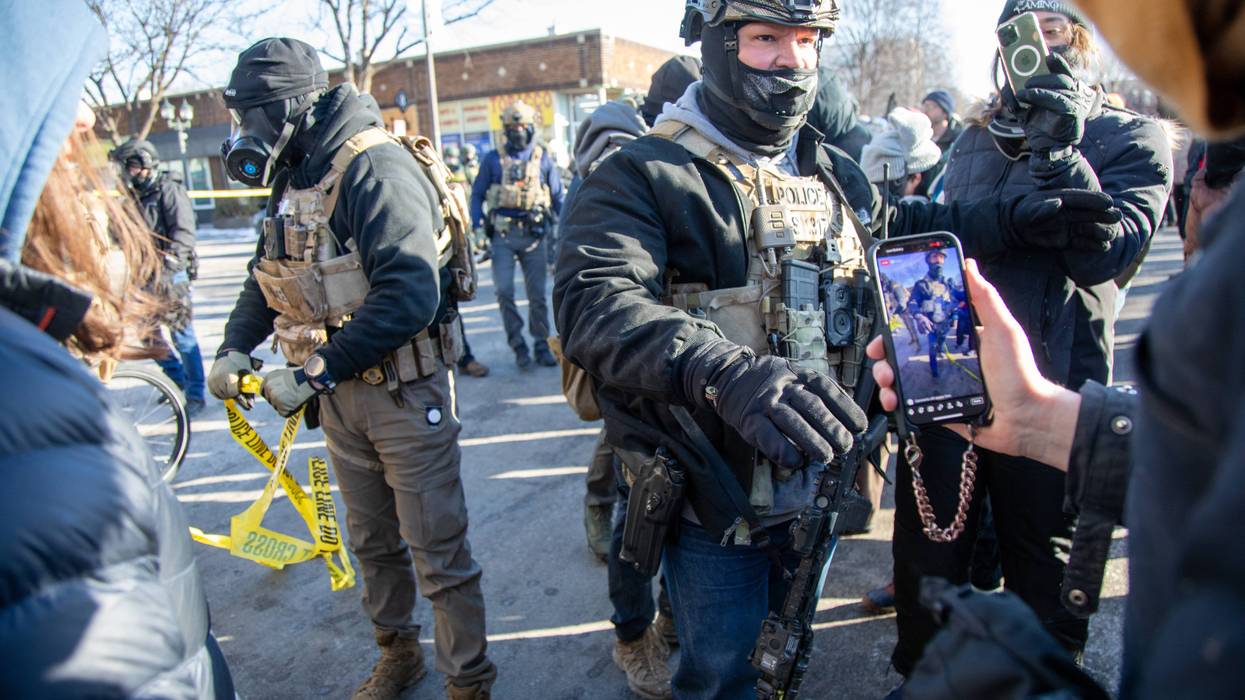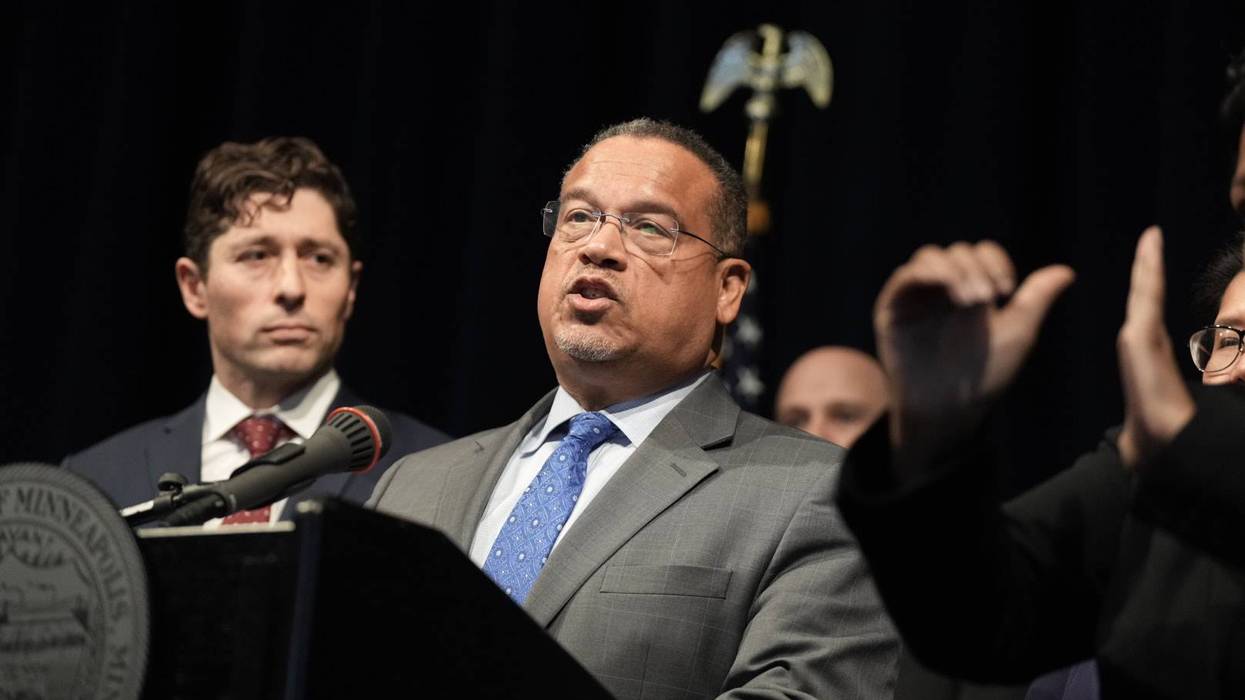Body Camera Footage and Texts Show DHS Lied About Shooting of Marimar Martinez in Chicago
"We live in a strange time right now where we cannot trust our federal government," said Martinez's lawyer.
Newly released evidence shows that the Department of Homeland Security lied about the shooting of yet another US citizen.
In October, a Border Patrol agent shot Marimar Martinez, a 30-year-old school assistant, five times while she was in her vehicle in the Brighton Park neighborhood of Chicago. She had been tailing agents while warning the neighborhood that “la migra” was coming.
Immediately after the shooting, DHS leapt to defend the agent who shot Martinez, Charles Exum. The agency claimed in an incident report that Martinez was blocking agents and had "rammed" them with her car. The agency described her as a "domestic terrorist."
Martinez, who survived the shooting, was charged with assaulting officers and pleaded not guilty.
The government's case was fatally undermined in November when it was revealed during a hearing that Exum had bragged to friends about injuring Martinez over text message: “I fired five rounds, and she had seven holes. Put that in your book, boys," he said.
Martinez's lawyers also said body camera footage—kept under seal by a federal protective order—showed a different series of events from what the agency had portrayed.
In November, federal prosecutors dropped the case against Martinez without explanation. But even afterwards, federal officials have continued to label her as a terrorist.
"This is before there’s any investigation done," said her attorney Chris Parente, who has argued that the public should be able to view the evidence for itself.
On Wednesday, the US Attorney’s Office in Chicago released body camera footage from two other agents involved in the incident—Adam J. Perkins and Lorenzo Cordero—as well as dozens of Exum's other emails and text messages from the incident's aftermath.
Parente, who presented the evidence in a press conference on Wednesday alongside Martinez and her other lawyers, said that with the release, “People can actually see the real evidence as opposed to the false claims by our government.”
He said the release after several months of keeping the footage buried was a "misguided attempt to take the sting out of just how damaging it is for the government.”
Block Club Chicago, which reviewed the body cam footage, explained that it "counters the incident report’s narrative" that Martinez had been the aggressor. Rather, it shows that she was attempting to drive away and that agents chose to ram her.
It shows Cordero and Perkins with weapons drawn and pointing out the rear passenger window about one minute before the collision and shooting of Martinez.
The phrase “it’s time to get aggressive” and “we’re going to make contact, we’re boxed in,” can be heard by one of the three agents before Exum is seen yanking his steering wheel to the left and hitting Martinez’s car.
After the collision, Exum is seen getting out of the car and firing five shots within two seconds.
The body camera footage verifies claims made by Martinez's attorneys, who said that after drawing their weapons, one of the agents could be heard saying, "Do something, bitch."
It also provides support to attorneys’ claims about text messages sent by agents after the shooting. Exum is seen bragging about the shooting, calling it a “great new scenario to add to our training.” Other agents sent messages praising him: One called him “a legend among agents.” Another said, “Good job, brother, glad you’re unharmed.” A third said, “Beers on me.”
Exum replied with the phrase "Fuck around and find out," which has been an oft-used slogan within the Trump administration to justify killings by law enforcement and the military.
Exum also discussed the "big time" support he was getting from top Trump administration officials. He said "everyone" had been "supportive," including then-Border Patrol Commander at Large Gregory Bovino, Border Patrol Chief Mike Banks, Homeland Security Secretary Kristi Noem, and even "El Jefe himself," likely referring to President Donald Trump.
Less than four hours after the shooting, Exum received an email from Bovino, who offered to extend his retirement age beyond 57 and praised his "excellent service to Chicago."
On Wednesday, the same day the new evidence was released, a Customs and Border Protection spokesperson told the Chicago Sun-Times that Exum has now been placed on administrative leave. They did not clarify how long the leave would last or when it began.
Parente said the smearing of Martinez as a terrorist fits a pattern that the Trump administration has since used to justify other shootings by agents.
"We live in a strange time right now where we cannot trust our federal government," he said. “Within an hour of the actual incident, DHS branded [Martinez] a domestic terrorist. The same thing they did to Renee Good. The same thing they did to Mr. [Alex] Pretti,” referring to two other US citizens shot and killed last month by agents in Minneapolis.
Martinez has announced plans to sue the federal government and Exum for "tens of millions of dollars," citing physical injuries to her right leg, right forearm, and chest; reputational damage; and emotional harm.
During a hearing earlier this month on Capitol Hill about the violent use of force by DHS agents, she described the shooting as an attempted "execution."
"I looked down and noticed blood gushing out of my arms and legs, and I realized I'd been shot multiple times," she said. "What happened to me in a matter of seconds on October 4th will unfortunately be with me for a lifetime."


